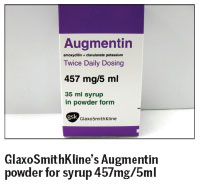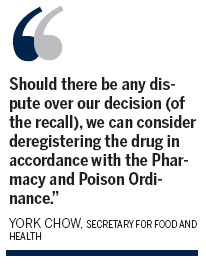Pharmacy giant bows to drug recall
Updated: 2011-06-11 07:41
By Ming Yeung(HK Edition)
|
|||||||||

GSK accepts recall demand after health authority threatens deregistration
The British pharmaceutical giant GlaxoSmithKline (GSK) finally has submitted to a demand that it recall a pediatric medication tainted by a plastic additive, after the government threatened to deregister the drug if the company refused to cooperate.
Details of the recall have yet to be disclosed.
A spokeswoman for GSK said the company is discussing logistical arrangements with the Department of Health.
On Friday, the health authority discovered an excess of plasticizer on Augmentin powder for syrup 457mg/5ml made in the UK and demanded a recall subsequently.
This followed a ban imposed on Thursday on the same medication for syrup 156mg/5ml type, manufactured in France, which was found containing 18 parts per million of the plasticizer DIDP, double the limit permitted by the European Union for food products.
The health authority had requested GSK recall the drug Augmentin within a week.

However, GSK refused to follow through, citing "the group of plasticizers to which DIDP belongs are ubiquitous and are present as trace compounds in the environment and in many common items of daily consumption".
Defending itself on Thursday night, the drug company insisted the level of exposure is "significantly lower than the levels that the US and European authorities deem to present a level of risk".
The company statement added: "GSK continues to support the safe use of the product as prescribed by a doctor or health provider".
Secretary for Food and Health York Chow confirmed the existing law is capable of coping with harmful food and medication.
"Should there be any dispute over our decision (of the recall), we can consider deregistering the drug in accordance with the Pharmacy and Poison Ordinance," Chow said.
Speaking on a radio show on Friday morning, Deputy Secretary for Food and Health Gabriel Leung said officials will seek the advice of the Department of Justice on whether a prosecution is warranted if the company did not cooperate.
"There are two ordinances applicable to this case. For the sake of public health protection, we will consider deregistering any problematic medication which is not suitable for human consumption," Leung said.
Even though the source of DIDP contamination remains unknown, Leung affirmed that the plastic additive found in the drug should not produce harmful side-effects for patients who have taken the medicine.
In response to a claim that local media had found excessive plasticizer in instant noodles, the deputy secretary said the authority tests food and medication every day according to inherent risk.
"We have to prioritize the imported food and drugs we test each day because it is impossible to test all of them," Leung said.
China Daily
(HK Edition 06/11/2011 page1)